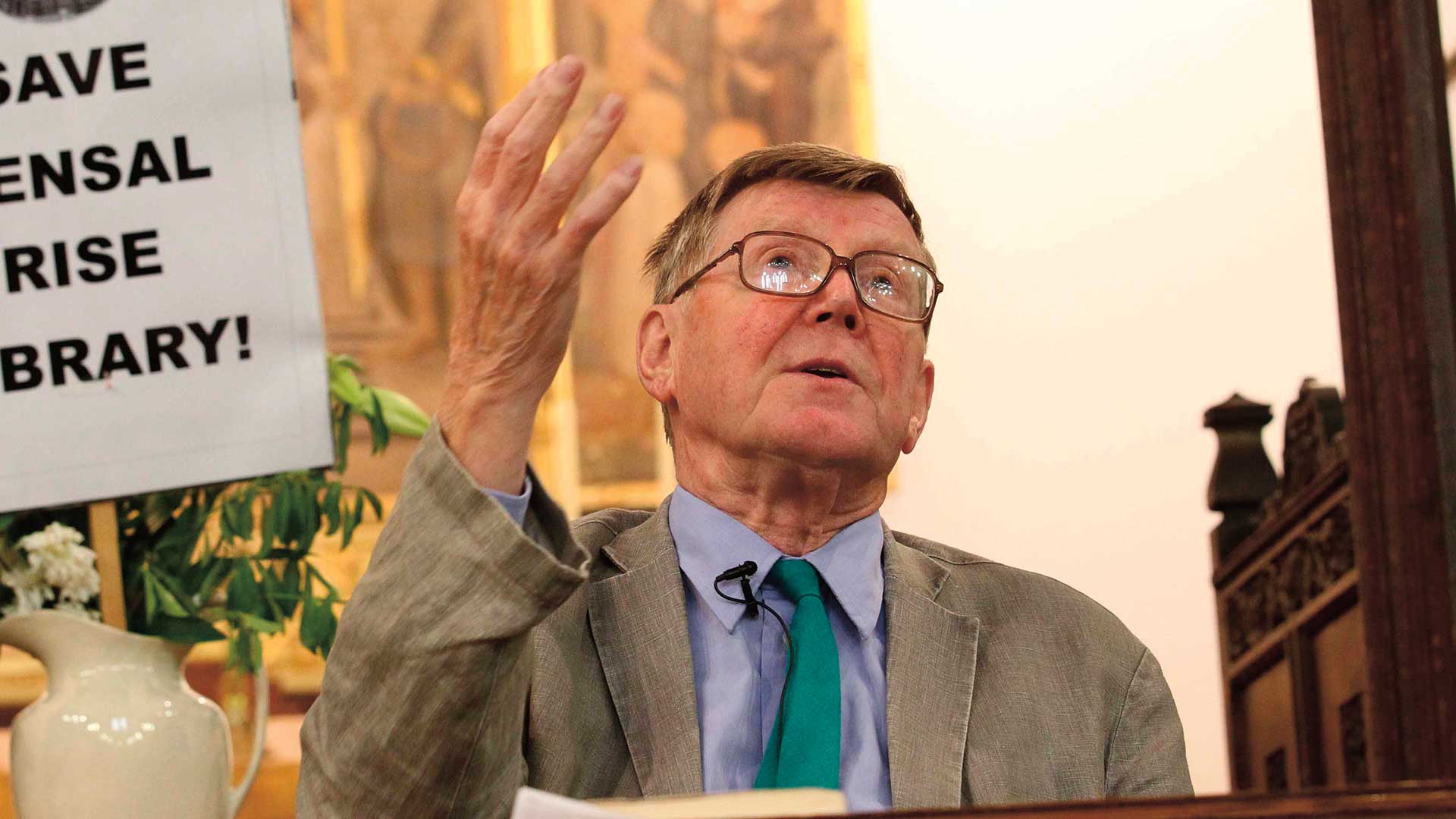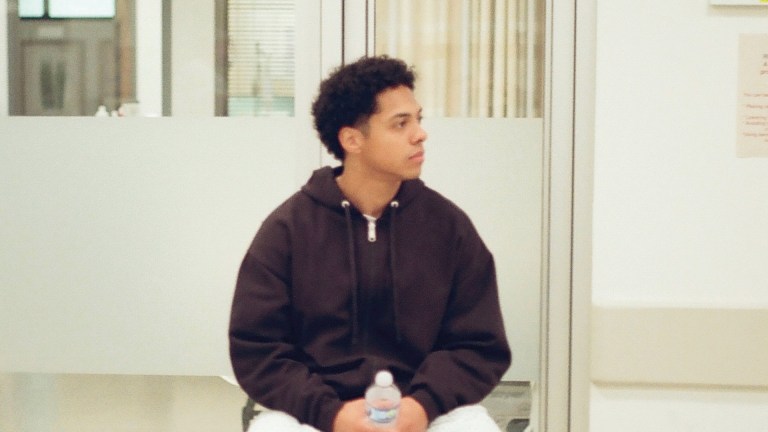After our chat he is off to sign copies prior to their despatch to booksellers, managing 600 in an hour. When Writing Home was published, Bennett visited bookshops up and down the country for signing sessions. He was usually happy to oblige with special messages but was somewhat taken aback when a young man asked him to write his girlfriend’s name and the message “sorry about last night” above the signature. Naturally, he obliged.
Bennett goes to his desk every morning, though he never says what he’s working on, or not. He doesn’t subscribe to the aggrandisement of writer’s block. “Things do come more slowly but I don’t think of it as writer’s block. You just look out the window a bit more.” As to the diaries, he doesn’t write every day. “There’d be no point. If I do write more often in the diary it’s generally because something’s going wrong and I’m complaining, and that’s no interest to anyone, scarcely to me.” He scribbles on anything that’s to hand: “I’ve no time for those – what are they called, Moleskine notebooks? No time for that at all.”
Keeping On includes miscellaneous writings and two play scripts but it’s the diaries that attract attention – and with good reason for they offer a real insight into Bennett the man, who we’ve come to know so much better in recent years. A touching portrait of easy domesticity emerges as he and Rupert, his partner of some 20 years, pursue their shared interests which are surprisingly bucolic for two townies. Weekends are often spent in Yorkshire, Bennett having retained the cottage his now-fabled parents bought for their retirement.
“They moved to the country in 1966 – my father always longed for a garden – and we’ve been in the village ever since but I don’t think of myself as a country boy, really,” Bennett reflects. “I feel at home in Yorkshire – not more at home but like here people know me. I’m virtually the oldest inhabitant. The good thing is that when Rupert turned up no eyebrows were raised. It’s a very tolerant place.
“Rupert quite likes doing the same thing again and again. He’d as soon go back to a place as go somewhere new.” Bennett had a passing interest in antiques, inherited from his mam, while Rupert knew little about churches, about which Bennett is knowledgeable: “In a slapdash way – I don’t have any of the architectural terms.” They most enjoy those on which little money has been lavished: “Tiny churches in the middle of nowhere. Town churches the Victorians knocked about far too much.” Their favourite is one William Morris saved near Kelmscott, though Bennett can’t remember the name (“this is what happens, you see”). He takes a guidebook from the shelf but the print is too small and eventually he decides that perhaps it’s best not to identify it lest the hordes descend.
Advertising helps fund Big Issue’s mission to end poverty
As the government continues to pick the state clean, one marvels at its ingenuity in finding institutions still left unsold
Creatures great and small gambol through the pages of his diaries, from the baby robin clinging perilously to its nest, pecking, “almost out of politeness”, at the oats Bennett provides, to a Yorkshire cow dispensing a friendly lick. Hens, he notes, “don’t repay affection” while “Lucy, a donkey at Thistleyhaugh, the farm where we are staying, has never recovered from the death of her mate… One of the real regrets in my life is that I have never kept a donkey.”
I tell him my own love of donkeys began with Ned, the Lonely Donkey, a Ladybird book I read over and over as a child. Bennett claims to remember it. “When we first moved to the village there was a donkey in the meadow opposite. There’s now a house but no donkey,” he says. “I used to go and stay with Alec and Merula Guinness and there was a donkey in their field. I remember once feeling very low and I was sat in this field and the donkey came and licked my head. That was a blessing, really. They seem such benevolent creatures. Rupert’s the same – he’d have one if he could.” Surely it’s not too late? “It is, we’d have to alter our whole lifestyle.” I tell him I sponsor one. “It’s not so altruistic a feeling as that! I just would like a donkey out of the window, as it were.”
Thoughts and aperçus, observations and recollections, fill the book, the serious and the silly, the high-flown and the self-consciously vulgar, all cheek by jowl: In the Vatican Museum Bennett conjures up an image that could come from a Donald McGill seaside postcard as he describes “a Michelangelo hulk – hunk, too, probably once upon a time – thighs and crotch that has lost its cock but kept its scrotum… I come round a corner on a nun, in uniform, gazing on a naked Venus.” Mark Carney pontificates on interest rates from the pulpit of Lincoln Cathedral: “How long before one of Mr Osborne’s rallying calls to the nation is embedded in Sung Eucharist?” Elizabeth Taylor dies, reminding Bennett that she once “perched” on his knee and was “a hefty burden”. Margaret Thatcher’s sense of humour bypass made her “a seriously flawed human being”.
Blair is very hard to forgive. Cameron I found contemptible really
There’s also a simmering anger which frequently bubbles over at the decaying state of a nation that claims to revere Shakespeare yet closes its libraries. “I blame Mrs Thatcher,” he tells me several times, fearing he will die under a Tory government. Labour may sometimes be foolish but the Tories are always knaves. He writes despairingly: “As the government continues to pick the state clean, one marvels at its ingenuity in finding institutions still left unsold.”
Not surprisingly, Bennett has been active in the campaign to save local libraries and a supporter of Occupy’s campers at St Paul’s. Education is the issue about which he’s most passionate. That students are “saddled with these enormous debts is just monstrous”. It is, he believes, “the mark of a civilised society that you do not think, who’s going to pay for my education?”
Who is he most offended by? Bennett pauses before replying. “Blair is very hard to forgive. Cameron I found contemptible really.” As to May, the jury’s out, though one suspects not for long. I ask if he thinks it’s possible to be both Conservative and Christian. Bennett laughs. “If I said ‘no’ the shit would really hit the fan!”
Advertising helps fund Big Issue’s mission to end poverty
Keeping On Keeping On (Faber) is out in hardback
Interview: Liz Thomson / @LizofMuesliHill









